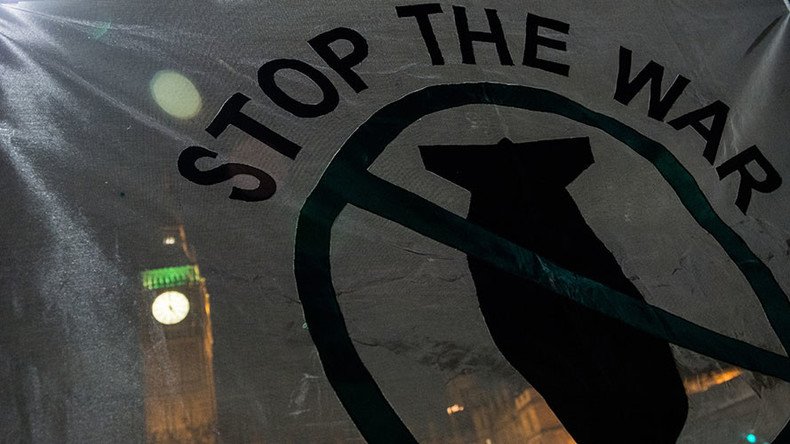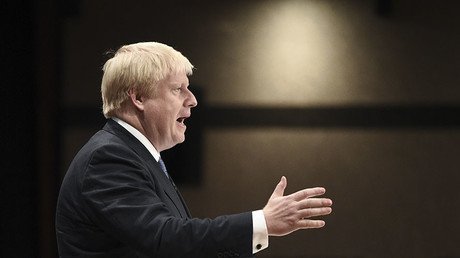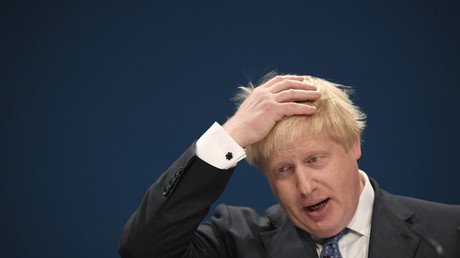Protest outside Russian Embassy would increase hysteria against Russia – Stop the War leader

Britain’s Stop the War Coalition has rejected UK Foreign Secretary Boris Johnson’s call to stage protests outside the Russian Embassy in London, claiming the demonstrations would only contribute to the "hysteria" and “jingoism” against Russia.
During an emergency House of Commons debate on Tuesday, Johnson criticised Britain’s “anti-war protest groups” for failing to hold demonstrations condemning Russian involvement in Syria, just as activists opposed Britain’s invasion of Iraq in 2003.
@STWUK Vice-Chair Chris Nineham speaking on the @BBCr4today this morning: https://t.co/TfCwUlHBrFpic.twitter.com/4BSVrEDl0m
— Stop the War (@STWuk) 12 October 2016
“There is no commensurate horror. It seems to me, amongst some of those anti-war protest groups. I’d certainly like to see demonstrations outside the Russian Embassy. Where is the Stop the War Coalition at the moment? Where are they?” Johnson asked.
Rejecting the Foreign Secretary’s call, Stop the War vice chairman Chris Nineham told the BBC Radio 4 Today program on Wednesday: “The reason for that is our focus is on what our government is doing.”
“There’s a very good reason for this, because we can make a difference to what Britain does, we can make a difference to what our allies do to a certain extent and we have done.”
“But, if we have a protest outside the Russian Embassy, it wouldn’t make a blind bit of difference as to what [Russian President Vladimir] Putin does because we are in Britain and were are in the West.”
“And, not only that – a protest outside the Russian Embassy would actually contribute to increasing the hysteria and the jingoism that is being whipped up at the moment against Russia.”
He added: “What we are saying is there is a hysteria which is being organised by politicians and the media against Russia to see Russia as the only problem in Syria.”
Nineham said the Foreign Secretary’s calls for demonstrations were “characteristically trivialising.”
Russia responded to Johnson’s proposals within minutes, by making a mocking reference to an earlier statement by the Foreign Secretary, who claimed that the “most potent weapon” against Russia is “shame.”
“It looks like Boris Johnson has moved from words to action, and has unleashed the very weapon with which he threatened Russia – shame,” said Russia’s Foreign Ministry spokesperson Maria Zakharova on her official Facebook feed. “As of now, we all feel ashamed on his behalf.”
The Russian Embassy in London also expressed its concern over Boris Johnson’s statements by calling the UK parliamentary debate on Syria “depressing.”
Very unusual call from the Foreign Secretary to hold demonstrations in front of the Russian embassy. New form of British diplomacy? pic.twitter.com/rzxUkGyyrQ
— Russian Embassy, UK (@RussianEmbassy) October 11, 2016
“The speeches of those who participated in the discussion contradict the logic of all previous decisions of the International Syria Support Group (ISSG) as well as UN Security Council resolutions,” the embassy’s press secretary said in a statement, stressing that the UK is a member of both the UNSC and the ISSG.
The embassy also expressed its regret over the fact that “the British parliamentarians placed themselves on the wrong side of history” as "Syria is going through the hard process of defeating terrorists.”
Asked whether Theresa May supported Johnson’s call for protests, the prime minister’s official spokeswoman said there are “a range of ways we can be shining the spotlight on Russia’s actions.”
A spokesman for the leader of the Labour Party, Jeremy Corbyn, meanwhile, said the priority should be “holding talks inside the Russian Embassy rather than demonstrations outside.”
The spokesman said the focus on Russian and Syrian Army actions sometimes diverted attention from the actions of other players in the conflict.
“Independent assessments are that there have been very large-scale civilian casualties as a result of the US-led coalition bombing. There are several cases of large numbers of civilian deaths in single attacks, and there hasn’t been so much attention on those atrocities or those casualties,” he said.















